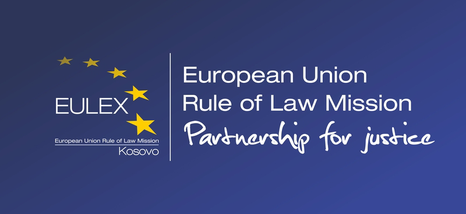European Union Rule of Law Mission in Kosovo

The European Union Rule of Law Mission in Kosovo, EULEX KOSOVO is a deployment of European Union (EU) police and civilian resources to the Republic of Kosovo as foreseen under the Ahtisaari plan. This rule of law mission is projected as a continuation of the international civil presence in Kosovo envisaged by the United Nations Security Council Resolution 1244, although Russia and Serbia see the mission illegal. The mission includes 2,000 police and judicial personnel, and began a four month deployment process on 16 February 2008.[1][2]
Composition and deployment

A 1800-1900 strong mission was approved by The European Council on 14 December 2007. This was later increased to 2000 personnel due to an increase in expected instability due to a lack of an agreement with Serbia.[3] It consists of police officers (including four anti-riot units[4]), prosecutors and judges - hence focusing on issues on the rule of law, including democratic standards. The size of the mission means Kosovo will soon be home to the largest number of EU civil servants outside of Brussels.[5] Chef of the mission is Yves de Kermabon, who is accountable to the European Union Special Representative in Kosovo, Pieter Feith. The mission is expected to cost €165 million in its first year.
The final decision on the mission was planned to be taken on 28 January 2008.[6] This was postponed due to concerns over possible negative effects on the second round of the presidential election in Serbia on 3 February 2008 and the possible signing of the Stabilisation and Association Agreement with Serbia on that date.[7] The officially voiced reason for the postponement is the lack of a legal basis (through a UNSC resolution or something similar) for the mission.[8] A Joint Action was approved on 4 February 2008, meaning that only the final approval is required; it is expected to be given on 18 February 2008.[9]
Spain will not take part in EULEX mission until legal questions over how it will replace the UN administration are answered. Spanish Foreign Minister Miguel Ángel Moratinos told a meeting of European Union Foreign Ministers in Slovenia that Spain will not send its contingent to the EULEX mission until there has been a formal transfer of powers from the United Nations.[10]
Apart from EU members, third parties Croatia, Turkey, Switzerland, Norway and the United States will also take part.[11]
Political situation

Key:
The EU's has been attempting to lead on the issue of Kosovo through its involvement but has been divided on whether to recognise an independent Kosovo (for individual member states' stances on recognising Kosovo, see map to the right) without international and Serbian approval. The agreement was seen as ensuring the unity of the EU on the question, however the Presidency announced it would not amount to recognition of an independent Kosovo.[12]
The EU has stated its mission will be legally based on United Nations Security Council Resolution 1244, which introduced the international rule of Kosovo in 1999.[12] However Serbian Prime Minister Vojislav Kostunica criticised the move stating: "It is unacceptable that the illegitimate arrival of an EU mission to the province is discussed so that Ahtisaari's plan for creating a puppet state may be implemented". Serbia also views the mission as an EU recognition of an independent Kosovo.[13]
See also
- Overseas interventions of the European Union
- Kosovo status process
- European Union Planning Team (EUPT)
References
- ^ EurActiv.com - Serbia, Russia fury as Kosovo independence draws near | EU - European Information on Enlargement & Neighbours
- ^ EUobserver.com
- ^ EurActiv.com - Serbia, Russia fury as Kosovo independence draws near | EU - European Information on Enlargement & Neighbours
- ^ FACTBOX: EU launches Kosovo police and justice mission | Reuters
- ^ de Kuijer, Pim (2008-02-18) [Comment The 28th member state], EU Observer
- ^ Kosovo leaders agree a grand coalition, independence "top priority"
- ^ EU mulling over timing of police mission to Kosovo - People's Daily Online
- ^ B92 - News - Politics - EU to postpone sending mission to Kosovo
- ^ B92 - News - Politics - EU adopts Kosovo mission plan in urgent procedure
- ^ Spain Holds Staff From EU Kosovo Mission
- ^ Croatia in Kosovo mission
- ^ a b Vucheva, Elitsa and Renata Goldirova (2007-12-14) EU agrees on Kosovo mission, EU Observer
- ^ Vucheva, Elitsa (2007-12-17) EU Kosovo mission 'unacceptable' for Serbia, EU Observer
